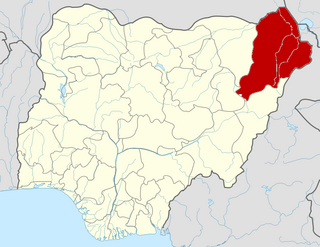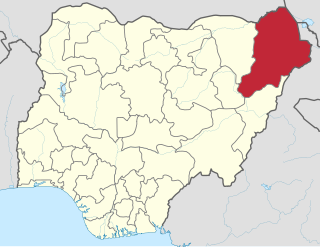
Gugulethu is a township in the Western Cape, South Africa and is 15 km from Cape Town. Its name is a contraction of igugu lethu, which is Xhosa for our pride. The township was established along with Nyanga in the 1960s.

Crime in South Africa includes all violent and non-violent crimes that take place in the country of South Africa, or otherwise within its jurisdiction. When compared to other countries South Africa has notably high rates of violent crime and has a reputation for consistently having one of the highest murder rates in the world. The country also experiences high rates of organised crime relative to other countries.

Manenberg is a township of Cape Town, South Africa, that was created by the apartheid government for low-income Coloured families in the Cape Flats in 1966 as a result of the forced removal campaign by the National Party. It has an estimated population of 52,000 residents. The area consists of rows of semi-detached houses and project-like flats, known as "korre". The township is located about 20 km away from the city centre of Cape Town. It is separated from neighbouring Nyanga and Gugulethu townships by a railway line to the east and from Hanover Park by the Sand Industria industrial park to the west and Heideveld to the north. The northern part of Manenberg has wealthy people that are mostly Muslims. The rest of Manenberg has poor people that are mostly associated with Christianity.

Boko Haram, officially known as Jamā'at Ahl as-Sunnah lid-Da'wah wa'l-Jihād, is an Islamist militant organization based in northeastern Nigeria, which is also active in Chad, Niger, northern Cameroon, and Mali. Boko Haram was the world's deadliest terror group during part of the mid-2010s according to the Global Terrorism Index. In 2016, the group split, resulting in the emergence of a hostile faction known as the Islamic State's West Africa Province.

Gwoza is a local government area of Borno State, Nigeria. Its headquarters are in the town of Gwoza, a border town "about 135 kilometres South-East of Maiduguri." The postal code of the area is 610.

The Boko Haram insurgency began in July 2009, when the militant Islamist and jihadist rebel group Boko Haram started an armed rebellion against the government of Nigeria. The conflict is taking place within the context of long-standing issues of religious violence between Nigeria's Muslim and Christian communities, and the insurgents' ultimate aim is to establish an Islamic state in the region.
The Baga massacre began on 16 April 2013 in the village of Baga, Nigeria, in Borno State, when as many as 200 civilians were killed, hundreds wounded, and over 2,000 houses and businesses worth millions of Naira were destroyed. Refugees, civilians officials, and human rights organizations accused the Nigerian Military of carrying out the massacre; some military officials blamed the insurgent group Boko Haram.
On 6 July 2013, Boko Haram insurgents attacked the Government Secondary School in the village of Mamudo in Yobe State Nigeria and killed at least 42 people. Most of the dead were students, though some staff members were also killed.
Timeline of the Boko Haram insurgency is the chronology of the Boko Haram insurgency, an ongoing armed conflict between Nigerian Islamist group Boko Haram and the Nigerian government. Boko Haram have carried out many attacks against the military, police and civilians since 2009, mostly in Nigeria. The low-intensity conflict is centred on Borno State. It peaked in the mid 2010s, when Boko Haram extended their insurgency into Cameroon, Chad and Niger.
The Konduga massacre took place in Konduga, Borno State, Nigeria on 11 February 2014. The massacre was conducted by Boko Haram Islamists against Christian villagers. At least 62 people were killed.
The Izghe attack was a terrorist incident that occurred on February 15, 2014.

The Gwoza massacre was a terrorist event that occurred on 2 June, 2014 in the Gwoza local government district, Borno State near the Nigerian-Camerounian border.
The following lists events from 2014 in Nigeria.
The 2015 Baga massacre was a series of mass killings carried out by the Boko Haram terrorist group in the north-eastern Nigerian town of Baga and its environs, in the state of Borno, between 3 January and 7 January 2015.

On the evening of 16 June 2019, three suicide bombers detonated their explosives in Konduga village in Borno State, Nigeria, killing 30 people and wounding over 40. The first bomber targeted football fans who were watching a game on television in the hall. He was blocked from entering the hall by the owner. A heated argument ensued, during which the bomber detonated his explosives. This attack was the most deadly suicide bombing in 2019 in Nigeria. Soon after, the other two - both of whom were female - blew themselves up nearby.

During the afternoon of 9 June 2020, a massacre occurred in a village in Gubio Local Government Area of Borno State, northeastern Nigeria. A group of gunmen on motorcycles and other vehicles attacked the village for over two hours, killing at least 81 people. Thirteen other people were injured in the attack, and seven others abducted. The attackers also killed over 300 cows and stole another 1,000. An Air Force fighter jet fired shots at the insurgents as they left. The insurgents returned the following morning, killing a herdsman who escaped the massacre, then set fire to the village. No group claimed responsibility, but suspicion fell on the jihadist group Boko Haram.
The Damasak massacre was a series of massacres and mass execution committed by Boko Haram in the city of Damasak, Nigeria.

The Koshebe massacre took place on 28 November 2020 in the village of Koshebe, Nigeria, in Borno State, when as many as 110 civilians and peasant farmers were killed and six were wounded as they worked in rice fields in Koshebe village, near the northeast Nigerian city of Maiduguri. The attack was thought to be carried out by the Boko Haram insurgency. About 15 women were also kidnapped.
In mid-January 2022, a bandit gang killed over 50 people in Dankade, Kebbi State, Nigeria.









